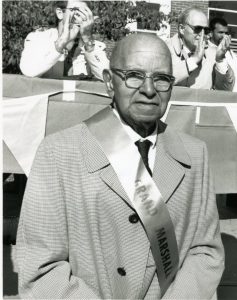In 1914, a young man from Worcester, Massachusetts enrolled in what was then called Connecticut Agricultural College to pursue a degree in animal science. He was the first Black student to attend the institution, was the only student of color during his four undergraduate years, and would go on to become the first Black graduate of what would become the University of Connecticut. This trailblazing student was Alan Thacker Busby.
As an out-of-state student, Busby worked throughout his time in Storrs to pay for his education. He found employment at the College’s animal barns, taking care of the facilities and the horses and dairy cows at Horsebarn Hill.
Nicknamed “Tack” by his classmates, Busby was a popular and accomplished student. His tireless work ethic was noted by his classmates, as Busby became an editor of the school’s newspaper, learned leadership and military skills in the R.O.T.C. program, founded a debate club, and was actively involved in sports, both as a player and scorekeeper.
After graduating with honors in 1918, Busby served for several months overseas in the United States Army in France during the final months of World War I. After being discharged, Busby returned to Storrs to work and finish paying for his education.
Inspired by his parents and shaped by his experiences in Storrs and overseas, Busby turned to a career in education. He taught for two years at a vocational school in New Jersey as an agricultural instructor and dairy farm manager. He later moved farther south and become a college professor and chair of animal husbandry at two Historically Black Colleges and Universities, Alcorn State University from 1921 to 1943 and Lincoln University from 1943 to 1966.
In 1932, Busby earned his master’s degree in animal husbandry and dairying from Cornell University.

While at Lincoln University, Busby became a counselor to veterans, advocating for the benefits available to those who had served and aiding them on their own college journeys. After retiring, Busby remained at the school as a counselor and also as president and treasurer of the Lincoln University Federal Credit Union, which he had founded to aid his fellow teachers.
At Busby’s retirement celebration he was described as “…unusually energetic and dynamic personality; is knowledgeable in many fields; gives of himself beyond the call of duty; is a great innovator; a great humanitarian and is charitable to a fault.”
Acknowledging Busby’s many contributions, Lincoln University renamed one of the largest certified organic research farms in the US in his honor, the Alan T. Busby Research Farm.
Busby continued to be remembered at Storrs and in 1969 was a recipient of the UConn Alumni Association’s Outstanding Alumnus Award.
When he returned to campus in 1990 to serve as the Homecoming Grand Marshal, Busby recalled experiencing only one racist remark during his time in Storrs, but according to Busby, “next thing I knew my friends took care of that guy and that was the end of that.”
Busby’s memory lives on for present UConn students. In 2006, the UConn Board of Trustees renamed the former Charter Oak Suites residence hall the Alan T. Busby Suites.
“Alan Busby should serve as an inspiration to all members of the UConn community,” says Indrajeet Chaubey, dean of the College of Agriculture, Health and Natural Resources, the home of the modern-day Department of Animal Science. “His memory and spirit live on within our College and the entire University, especially as we reckon with past injustice and work together to build a more equitable and inclusive UConn going forward.”
Follow UConn CAHNR on social media


